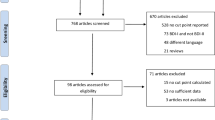Abstract
Issues concerning use of the Beck Depression Inventory (BDI) for the self-report of depressive symptomatology are raised and considered. Discussion includes the stability of depression and the need for multiple assessment periods, specificity and the need for multiple assessment measures, and selection cut scores and the need for terminological accuracy. Recommendations for the continued use of the BDI, designed to facilitate the integration of diverse studies and improve research on self-reported depression, are provided.
Similar content being viewed by others
References
Beck, A. T. (1967).Depression. Philadelphia: University of Pennsylvania Press.
Beck, A. T., Hollon, S. D., Young, J. E., Bedrosian, R. C., & Budenz, D. (1985). Treatment of depression with cognitive therapy and anitriptyline.Archives of General Psychiatry, 42 142–148.
Beck, A. T., Steer, R. A., & Garbin, M. G. (in press). Psychometric properties of the BDI: 25 years later.Clinical Psychology Review.
Beck, A. T., Ward, C. M., Mendelson, M., Mock, J. E., & Erbaugh, J. K. (1961). An inventory for measuring depression.Archives of General Psychiatry, 4 561–571.
Cronbach, L. J., & Meehl, P. E. (1955). Construct validity in psychological tests.Psychological Bulletin, 52 281–302.
Deardorff, W. W., & Funabiki, D. (1985). A diagnostic caution in screening for depressed college students.Cognitive Therapy and Research, 9 277–284.
Gotlib, I. H. (1984). Depression and general psychopathology in university students.Journal of Abnormal Psychology, 93 19–30.
Hamilton, M. (1960). A rating scale for depression.Journal of Neurology, Neurosurgery, and Psychiatry, 23 56–62.
Hammen, C. L. (1980). Depression in college students: Beyond the Beck Depression Inventory.Journal of Consulting and Clinical Psychology, 48 126–128.
Hammen, C. L. (1983).Cognitive and social processes in bipolar affective disorders: A neglected topic. Paper presented at the convention of the American Psychological Association, Anaheim, California.
Hatzenbuehler, L. C., Parpal, M., & Matthews, L. (1983). Classifying college students as depressed or nondepressed using the Beck Depression Inventory: An empirical analysis.Journal of Consulting and Clinical Psychology, 51 360–366.
Hollon, S. D., & Kendall, P. C. (1980). Cognitive self-statements in depression: Development on an Automatic Thoughts Questionnaire.Cognitive Therapy and Research, 4 383–395.
Ingram, R. E., Kendall, P. C., Smith, T. W., Donnell, C., & Ronan, K. (in press). Cognitive specificity in emotional distress.Journal of Personality and Social Psychology.
Kendall, P. C. (in press). Behavioral assessment and methodology. In G. T. Wilson, C. M. Franks, P. C. Kendall, & J. Foreyt.Behavior Therapy in Review. New York: Guilford.
Lehmann, H. J. (1959). Psychiatric concepts of depression: Nomenclature and classification.Canadian Psychiatric Association Journal Supplement, 4 S1-S12.
Meehl, P. E., & Rosen, A. (1955). Antecedent probability and the efficiency of psychometric signs, patterns, or cutting scores.Psychological Bulletin, 52 191–216.
Murphy, G. E., Simons, A. D., Wetzel, R. D., & Lustman (1984). Cognitive therapy and pharmacotherapy: Singly and together in the treatment of depression.Archives of General Psychiatry, 41 33–41.
Oliver, J. M., & Simmons, M. E. (1984). Depression as measured by the DSM-III and the Beck Depression Inventory in an unselected adult population.Journal of Consulting and Clinical Psychology, 52 892–898.
Ruehlman, L. S., West, S. G., & Pasahow, R. J. (1985). Depression and evaluative schemata.Journal of Personality, 53 46–92.
Rush, A. J., Beck, A. J., Kovacs, M., & Hollon, S. D. (1977). Comparative efficacy of cognitive therapy and pharmacotherapy in the treatment of depressed outpatients.Cognitive Therapy and Research, 1 17–37.
Sacco, W. P. (1981). Invalid use of the Beck Depression Inventory to identify depressed collegestudent subjects: A methodological comment.Cognitive Therapy and Research, 5 143–147.
Watson, D., & Clark, L. A. (1984). Negative affectivity: The disposition to experience aversive emotional states.Psychological Bulletin, 96 465–490.
Zimmerman, M. (1986). The stability of the revised Beck Depression Inventory in college students: Relationship with life events.Cognitive Therapy and Research, 10 37–44.
Author information
Authors and Affiliations
Rights and permissions
About this article
Cite this article
Kendall, P.C., Hollon, S.D., Beck, A.T. et al. Issues and recommendations regarding use of the Beck Depression Inventory. Cogn Ther Res 11, 289–299 (1987). https://doi.org/10.1007/BF01186280
Issue Date:
DOI: https://doi.org/10.1007/BF01186280



